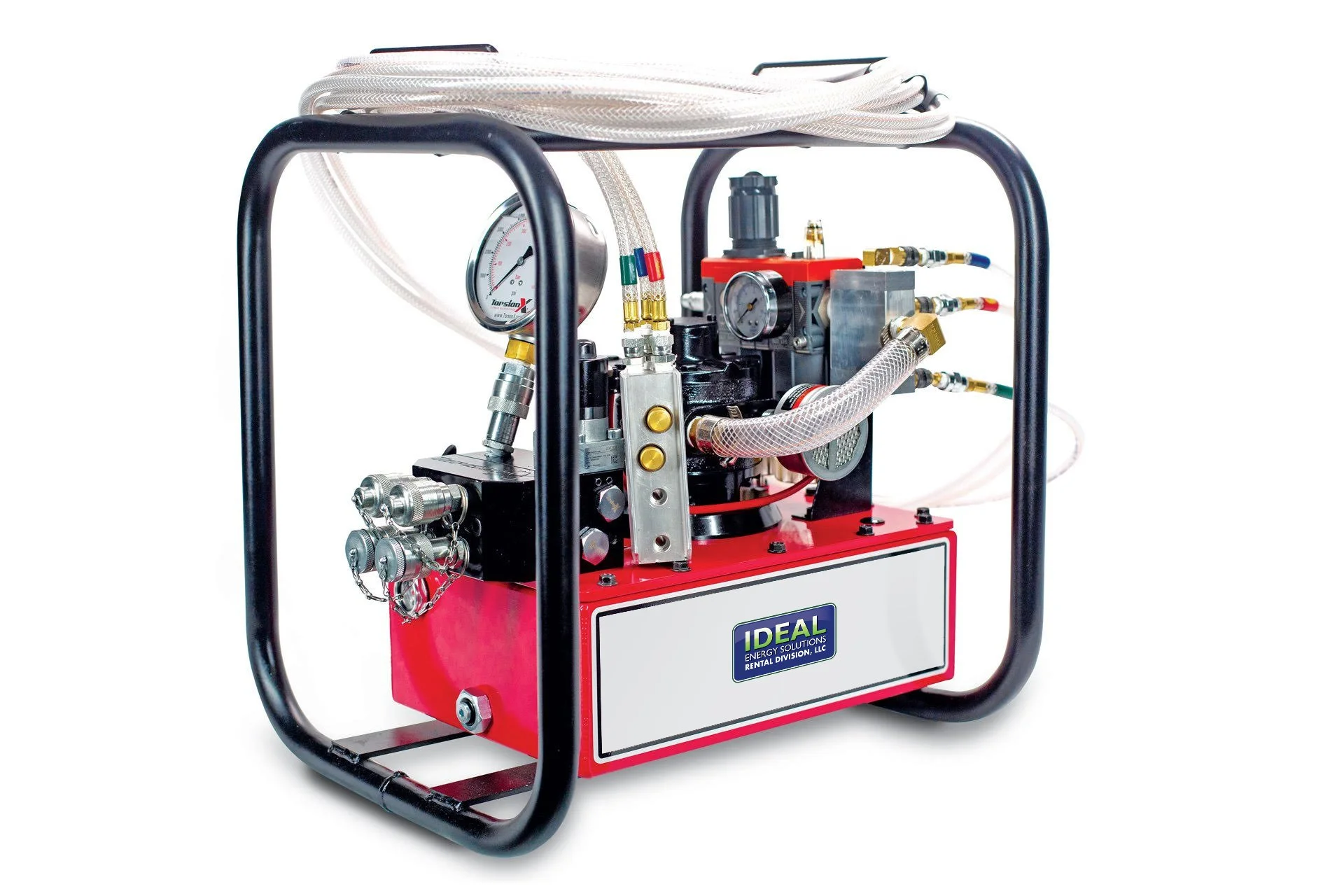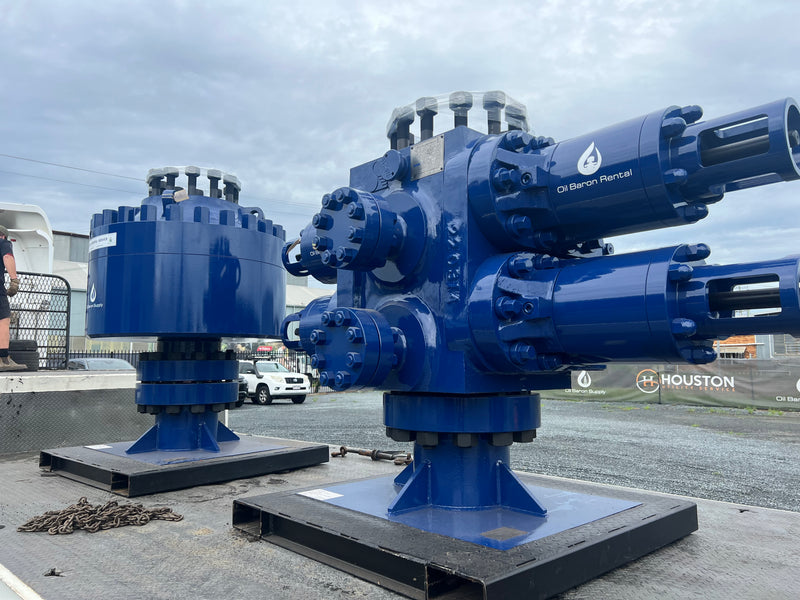Superior Oilfield Rentals Texas: FAQ before renting
Wiki Article
A Comprehensive Guide to the Numerous Sorts Of Oil Field Equipment and Pipeline Equipment Available
The oil and gas industry depends greatly on customized tools for efficient extraction and transportation. Numerous kinds of equipment, from drilling rigs to storage containers, play essential roles in this complex process. Each tool serves unique functions that add to general functional success. Recognizing these parts is essential for any person associated with the industry. As the industry develops, so as well do the innovations that support it. What developments are on the horizon?
Drilling Rigs: The Backbone of Oil Expedition
Drilling rigs act as the essential equipment in the domain of oil expedition, allowing companies to gain access to hydrocarbon books hidden deep under the Earth's surface. These rigs can be found in numerous types, consisting of land rigs, offshore rigs, and mobile systems, each developed to operate in certain atmospheres. Furnished with innovative modern technology, drilling rigs can permeate geological developments with accuracy, making certain effective source extraction. The structural integrity and functional abilities of these rigs are critical, as they should withstand extreme problems and significant pressures. The selection of a boring rig influences the total job price and timeline, making it an important consideration for oil business looking for to enhance their exploration efforts and optimize productivity in their operations.Pumps: Crucial for Liquid Motion
In the oil extraction process, the function of pumps is substantial, helping with the activity of fluids throughout numerous stages of manufacturing. Pumps are important for transporting unrefined oil, water, and other liquids from below ground reservoirs to the surface area and afterwards via pipes to refineries. They can be found in numerous kinds, including centrifugal, favorable displacement, and completely submersible pumps, each serving specific objectives based on the fluid features and functional demands. Centrifugal pumps are commonly used for their efficiency in high-flow applications, while favorable displacement pumps stand out in dealing with viscous liquids. The selection of pump effects overall performance, functional safety and security, and upkeep expenses. Appropriate selection and maintenance of pumps are crucial for optimizing manufacturing and minimizing downtime in oil field procedures.Valves: Controlling Flow and Pressure

Valves play a crucial function in managing the flow and pressure of liquids within oil fields and pipelines. Numerous sorts of shutoffs serve distinct applications, each created to fulfill details features fundamental for efficient procedure - Superior Rentals fusion machines. Recognizing the attributes and uses of these valves is important for maximizing system efficiency and safety and security
Sorts of Valves
Important components in oil area operations, shutoffs play an important duty in managing the circulation and pressure of liquids within pipes and devices. Various kinds of valves are made use of to fulfill the varied demands of oil and gas production. Usual kinds include gate shutoffs, which supply a straight-line flow and marginal stress decline; globe valves, recognized for their throttling abilities; and sphere shutoffs, acknowledged for their fast on/off control. Furthermore, check shutoffs protect against heartburn, while butterfly valves offer a lightweight option for regulating flow. Each valve type is developed with details products and arrangements to endure the rough conditions typically located in oil areas, making certain integrity and effectiveness in operations. Comprehending these kinds is vital for reliable system administration.Valve Applications and Functions
While different sorts of valves offer distinct objectives, their key applications revolve around managing flow and stress within oil and gas systems. Valves such as gate, globe, and round shutoffs manage liquid motion, making sure peak efficiency and security. Gateway valves are generally made use of for on/off control, providing very little circulation resistance. World valves, on the various other hand, offer specific flow guideline, making them suitable for throttling applications. Round shutoffs are favored for their fast operation and tight securing abilities. Furthermore, stress safety valve are crucial for avoiding system overpressure, protecting tools integrity. In general, the ideal selection and application of shutoffs boost operational efficiency, making sure the trustworthy transport of oil and gas with pipelines and handling centers.Compressors: Enhancing Gas Transport
Compressors play an essential role in the efficient transport of all-natural gas, making certain that it moves smoothly through pipelines over fars away. These tools raise the stress of gas, allowing it to conquer friction and altitude adjustments within the click to read pipeline system. Additionally, compressors facilitate the harmonizing of supply and need, accommodating fluctuations in usage and manufacturing rates. Various sorts of compressors are utilized in the sector, including centrifugal, reciprocating, and rotating screw compressors, each offering distinct advantages based on the functional requirements. Normal upkeep of these compressors is necessary to optimize efficiency and lessen downtime, ultimately contributing to a reputable gas transportation network. Their learn the facts here now crucial function emphasizes the relevance of compressors in the general oil and gas infrastructure.Storage Tanks: Safe and Effective Liquid Administration
Effective transport of gas relies upon various support group, among which is the proper monitoring of storage tanks. These storage tanks play an important function in safely containing fluids, guaranteeing that operational efficiency is preserved while lessening ecological risks. Built from resilient materials, they are developed to hold up against high stress and corrosive aspects. Appropriately sized and purposefully located, storage containers facilitate the smooth circulation of all-natural gas and various other fluids, protecting against traffic jams in supply chains. Regular upkeep and tracking are crucial to detect leakages or architectural issues, promoting safety and compliance with regulative requirements. Eventually, the reliable management of storage space containers is essential for the total honesty and integrity of the oil and gas market's fluid handling systems.
Pipeline Systems: Facilities for Transport
Pipeline systems function as the foundation of the oil and gas sector, helping with the reliable transportation of hydrocarbons over vast distances. These systems include different parts, including pipelines, valves, pumps, and compressors, all thoroughly designed to ensure smooth flow. The materials made use of in pipeline construction, commonly steel or high-density polyethylene, are picked for sturdiness and resistance to deterioration. Pipeline networks can span across land and water, linking manufacturing websites to refineries and circulation facilities. Additionally, advanced modern technology enables real-time monitoring of circulation prices and pressure degrees, boosting operational efficiency. The critical positioning of these pipes decreases ecological impact while taking full advantage of resource explanation availability, consequently playing a crucial duty in conference power needs around the world.Safety Equipment: Guaranteeing Worker and Environmental Defense
The operation of pipeline systems, while crucial for energy transport, likewise presents considerable safety and security obstacles for workers and the environment. Safety tools plays a considerable function in reducing these dangers. Personal protective equipment (PPE) such as safety helmets, gloves, and non-slip shoes safeguards employees from physical risks. In addition, gas discovery systems keep an eye on for leaks, making certain that dangerous compounds do not position a threat to employees or the surrounding community. Emergency situation shutdown systems are crucial for rapidly halting operations during a crisis, preventing prospective disasters. Spill control materials, consisting of absorbents and barriers, are basic for reducing ecological influence. Generally, purchasing all-encompassing safety devices is important for preserving operational honesty and securing both workers and the setting in the oil and gas market.
Often Asked Questions
How Do I Choose the Right Oil Field Equipment for My Project?
Choosing the right oil field tools entails reviewing task requirements, budget constraints, and operational requirements. Take into consideration aspects such as equipment integrity, compatibility with existing systems, and the vendor's reputation to ensure peak performance and security.What Are the Maintenance Needs for Oil Field Equipment?
Upkeep demands for oil area devices consist of routine examinations, lubrication, and prompt repairs. Operators should also abide by supplier standards, display efficiency metrics, and assurance compliance with security policies to improve longevity and efficiency.
How Can I Make Sure Compliance With Environmental Laws?
To guarantee compliance with ecological policies, firms should perform regular audits, carry out best methods, buy training, keep proper paperwork, and remain updated on regulations (Superior rentals squeeze tools). Collaboration with environmental firms can also enhance adherence to guidelinesWhat Is the Average Life-span of Pipeline Equipment?
The typical life expectancy of pipeline devices typically ranges from 20 to 50 years, depending upon variables such as worldly quality, environmental conditions, and maintenance practices. Normal evaluations can considerably affect long life and functional performance.How Do I Securely Carry Oil Field Equipment to Remote Locations?
Carrying oil field tools to remote areas requires mindful planning, consisting of course analysis, safeguarding authorizations, using suitable lorries, and making certain security methods are followed. Correct training and communication amongst staffs are essential for effective transport.Report this wiki page